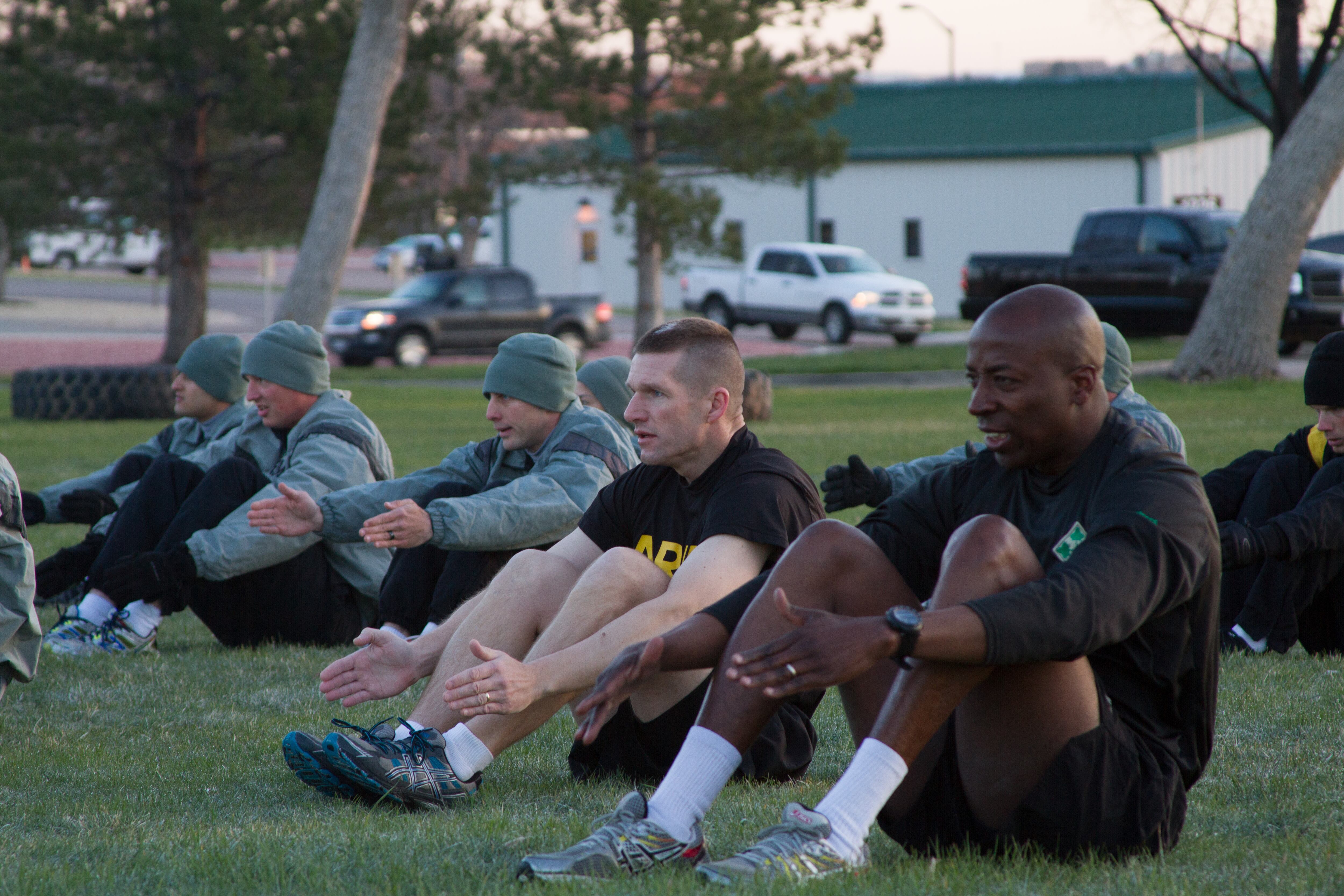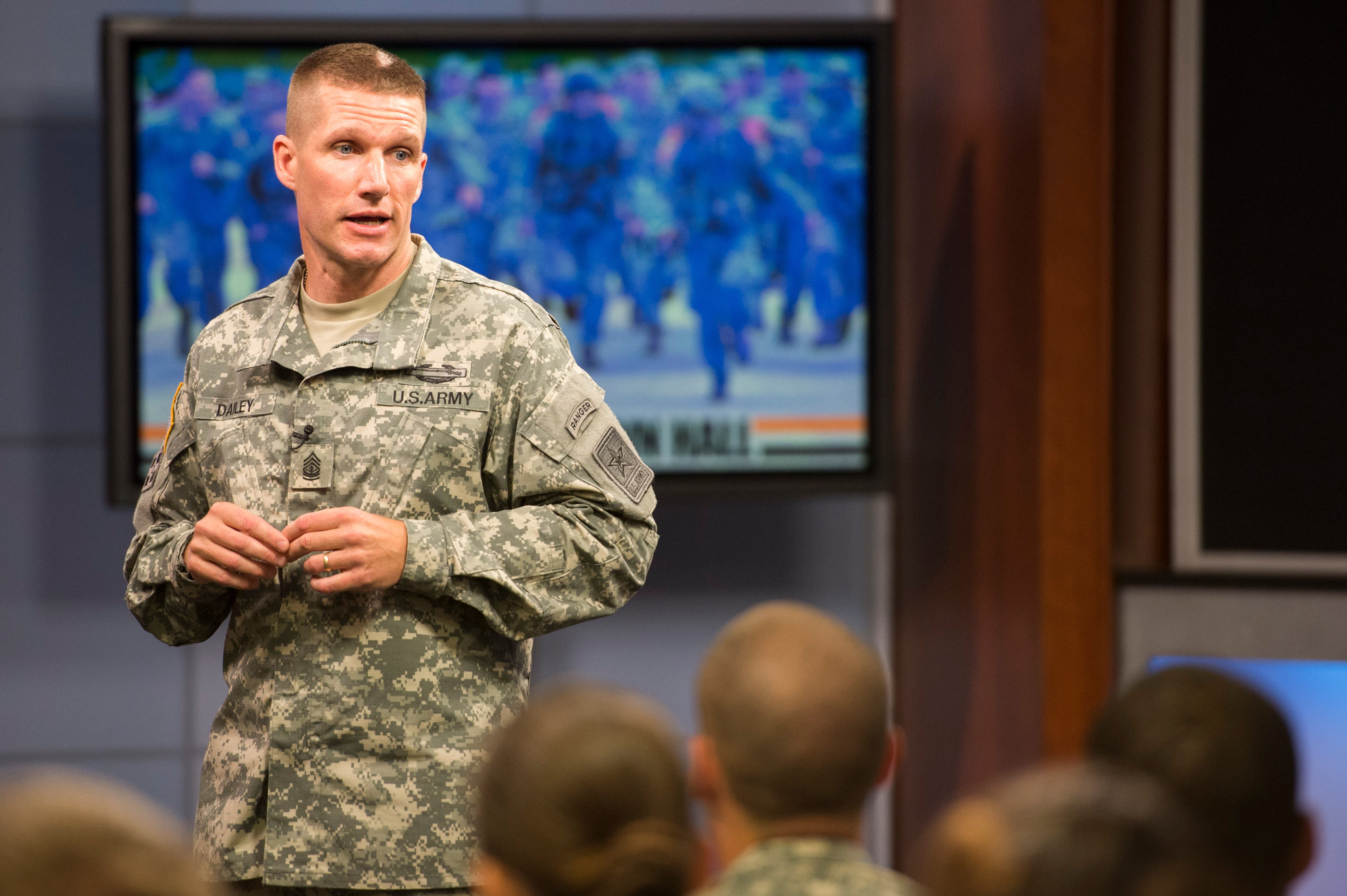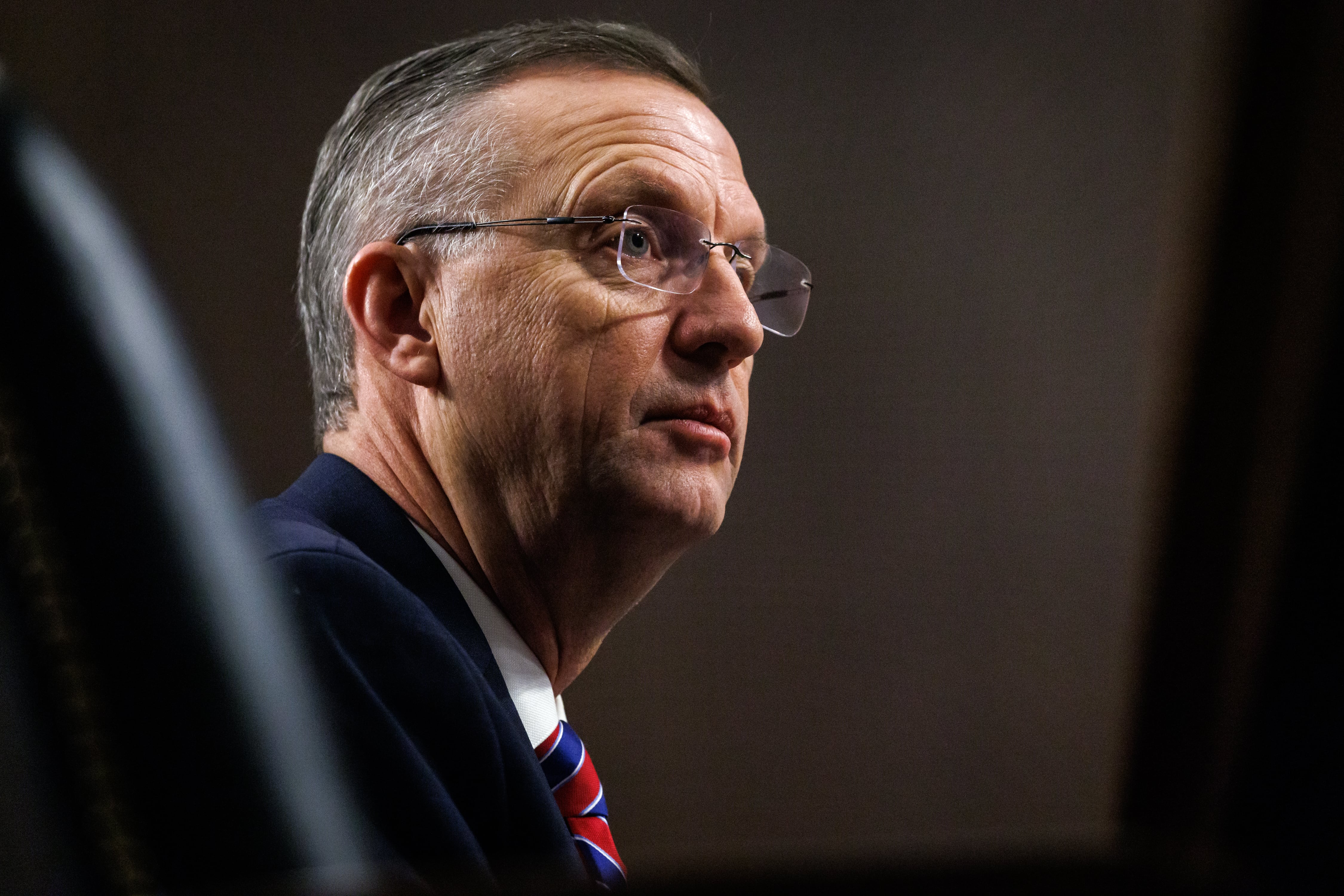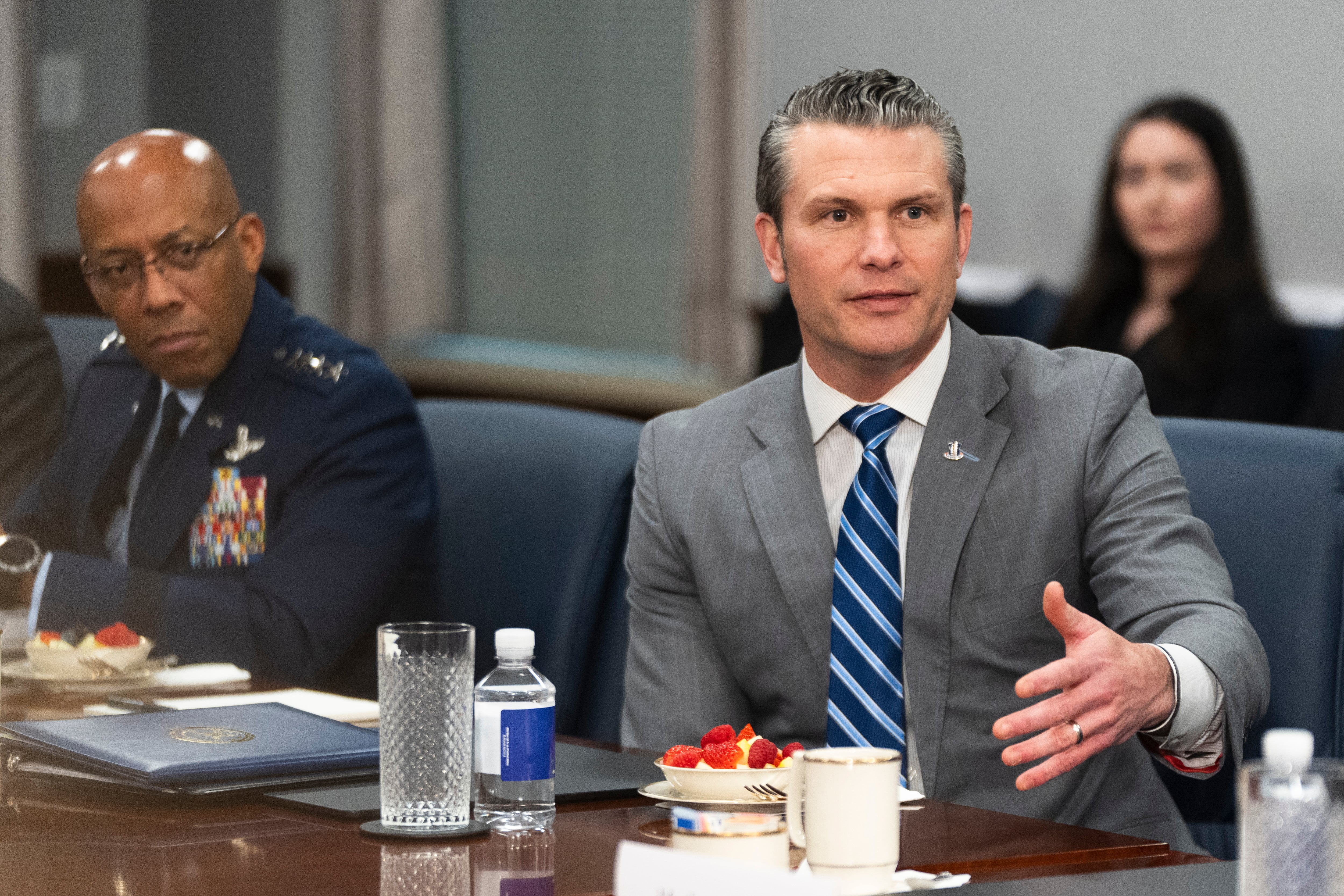Soldiers could soon be wearing black socks with their PT uniforms. The Army is looking at new ways to root out and punish cyber-bully soldiers. And expect more credentialing opportunities to prepare you for the civilian workforce.
These are a few of the highlights from a town hall hosted by Sergeant Major of the Army Dan Dailey on Thursday June 4 at Fort Meade, Maryland. The hour-long town hall was recorded and will be posted to the Defense Media Activity's website on June 12, and shared on Army social media accounts.
Town hall highlights:
Black socks for PT?
Dailey told the soldiers of a promise he made when he first assumed his post.
"I said, 'I am not going to be the uniform Sergeant Major,' " Dailey said in a nod to recent rollouts of new PT uniforms and a new Army Combat Uniform. "I think we need an era of stabilization."
For example, he said he would not push for any changes to the dress blues.
However, there is one suggested change in discussion, a suggestion he first heard just last month while in Hawaii: permitting black socks with the new black PT uniform. Dailey asked the crowd how many would prefer black to the current standard, which is white socks. The vast majority of soldiers raised their hands.
"Oh my goodness gracious. But I already told the chief I wasn't going to change the uniform," Dailey protested, jokingly.

Sergeant Major of the Army Dan Dailey PTs with soldiers on April 21 at Fort Carson, Colo. He encourages soldiers to speak up if they'd prefer black socks with their PT uniform.
Photo Credit: Rob Oson/Army
Dailey encouraged soldiers to continue speaking up for black socks. He will bring the issue up to the Senior Enlisted Council, a group of command sergeant majors from across the Army that meets monthly to discuss a variety of issues. Then it would have to get approval from the Uniform Board.
If there's a clear push for change from the force, Dailey said, "wWe will make recommendations to the chief of staff of the Army, and to the uniform board."
Early this year, after a few town halls, Dailey had heard from many soldiers that the tattoo policy was unfair. Dailey helped drive the decision to throw out the tougher rules. Getting the OK for black socks is probably much easier than reversing a body art decision, and he pulled that off.
Cyber bullying crackdown
A common joke among soldiers under SMA Ray Chandler's term was to be careful online because "SMA is watching you." Now it looks like SMA Daily — or at least Big Army— is watching, too. Dailey said the Army is looking at launching a more concerted effort to stem online bullying.
Dailey said some soldiers feel "like you have the Spartan shield when you get behind the computer" and say things they wouldn't say in public. That can harm soldiers, as well as the perception of the Army to the general public, Dailey said.

Sergeant Major of the Army Dan Dailey talks to soldiers during a Town Hall on Thursday at Fort Meade, Maryland.
Photo Credit: Staff Sgt. Chuck Burden/Army
"I don't want this to be misperceived as, 'wWe're coming after you on the iInternet,'" Dailey told Army Times after the taping. "We don't want to prevent soldiers from their freedom of speech. … But not at the detriment of another soldier."
He told soldiers that, "wWe don't steal from each other," and that includes intangibles like honor and pride. Dailey noted that current rules can cover punishing a soldier for online abuse, but that leadership has been is considering how to further deter such behavior. After the taping, he said the specifics of the initiative remain undecided.
"I don't want to get out in front of the chief and the secretary," Dailey said. "We are developing that and the chief and the secretary haven't made any final decisions on it."
As for SMA Dailey himself? He's not on Facebook, but his office may create an account. SMA Chandler had an active Facebook account. When he Chandler witnessed bad behavior online, he would sometimes personally look a soldier up on AKO and correct him.
No need to rush for new ACUs
Pvt. 1st Class Christopher French attended the town hall and modeled the new ACU, with Operational Camouflage Pattern, for the soldiers.
"We don't all need to rush out and get the new uniform," Dailey said. "This is not the iPhone 5."
There will be a long transitional period from the current gray-green Universal Camouflage pattern to OCP. The first OCP uniforms hit stores July 1, and the official wear-out date for old UCPs is Oct. 1, 2019.
Dailey said he expects soldiers to use their clothing allowances to switch to the new pattern over time. He plans to do the same.
"You're going to see the sergeant major of the Army wear this (UCP) uniform for some time. And then you're going to see a period where I'm wearing the new uniform sometimes, and the old uniform sometimes, and that's OK," Dailey said. "I've also told your chain of command the same thing. They're not to force you to go out and buy those things."
Not In My Squad
Dailey took the opportunity to continue to stump for his new initiative to reduce sexual harassment and assault and bullying among soldierss.
He has framed "Not In My Squad" as a grassroots effort to encourage NCOs to proactively disscourage and stop soldiers who behave inappropriately.
"I honestly, genuinely believe that 'Not In My Squad' is going to be where we need to go," Dailey told Army Times after the taping.
He said he didn't want the position of "dictator of Not in My Squad." To encourage buy-in, he said the Army will bring a selection of NCOs to Washington, D.C., to inform leadership on what kind of initiatives and themes would comprise it. The workshop begins June 16.
"If it's not theirs, if they don't design it, if they don't build it, they're not going to truly embrace it," Dailey said.
He also said it would go well beyond just Sexual Harassment and Assault Response Program representatives, and that he'd be encouraging NCOs to speak freely.
He said the Army would always be, at its core, a top-down organization. But he said it was also important to empower subordinate leaders to deal with these problems — problems the Army has spent substantial time and energy combating in recent years.
"We can't afford to do that. We have to stop it," Dailey said. "You can stop it. It's pretty simplistic: train and educate your soldiers. You know the difference between right and wrong. And you're going to get after it. If not, we're also going to hold you accountable."
After the Army
Dailey also talked about an in-progress initiative to increase the number of job certifications that can be earned during the course of serving in the Army. He said more is being done to help soldiers transition to the civilian professional world, and more work remains.
"The goal is to find a credentialing opportunity for every single skill-level and MOS in the Army," Dailey said. "In many cases, where we can, we are going to make sure that translation is better than it was in the past."
So far, that has resulted in 80 certifications since the initiative started about two years ago, Dailey said.
He uses the example of truck drivers in the Army, who he said are trained to drive vehicles — much heavier than tractor trailers and loaded with dangerous materials — up hill, in snow and other dangerous positions, at night and with the lights off. And he said there's a lower accident rate than U.S. truck drivers, a profession hungry for workers.
"We have all these great 88-Mikes, these great truck drivers leaving the Army, they have all these certifications, but yet the day they left the Army they only had a driver's license to drive their personal vehicle. It makes no sense," Dailey said.
He said the work will take time and said the Army will continue opportunities through partnerships with universities, trade schools and associations and businesses.





